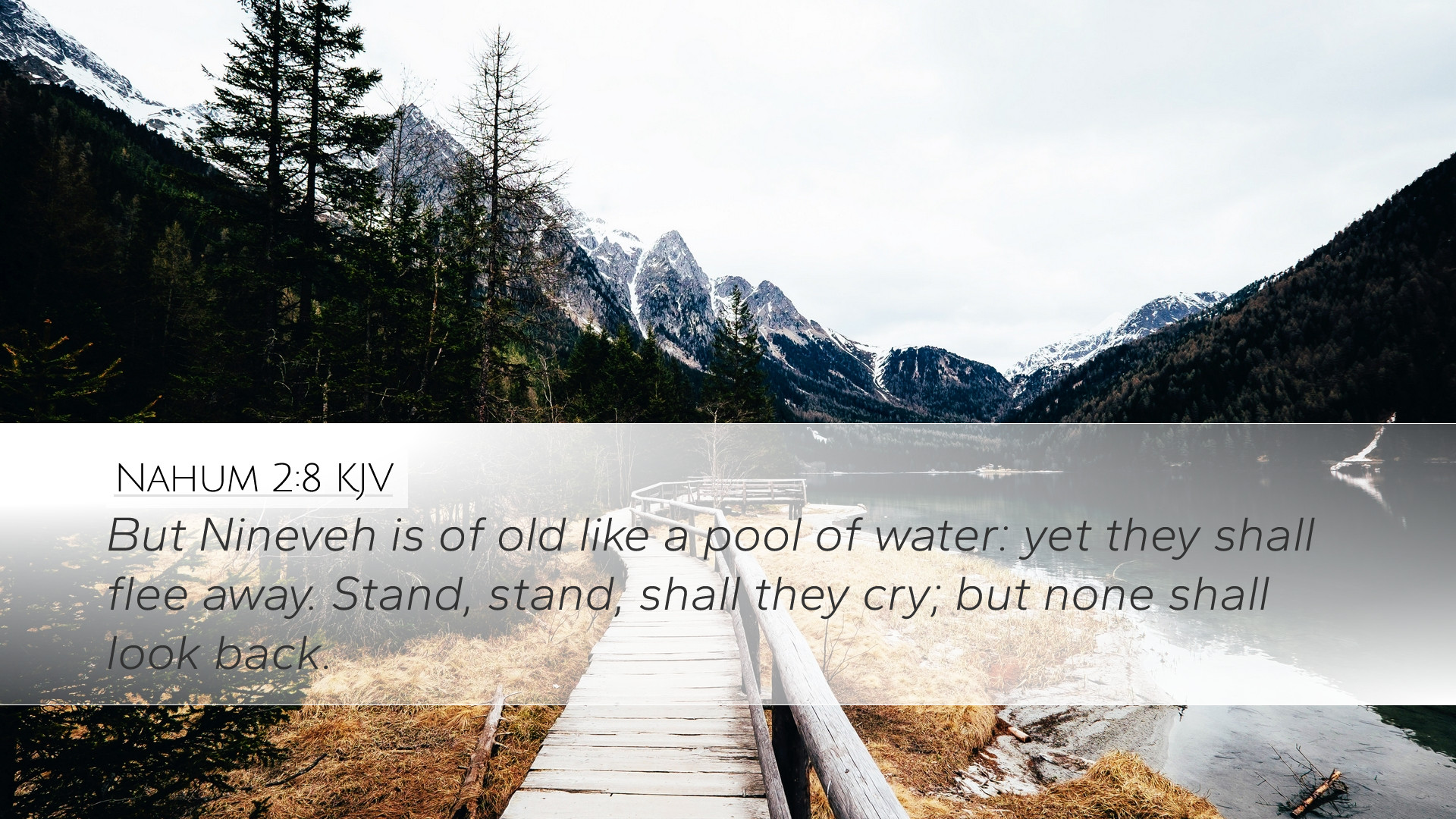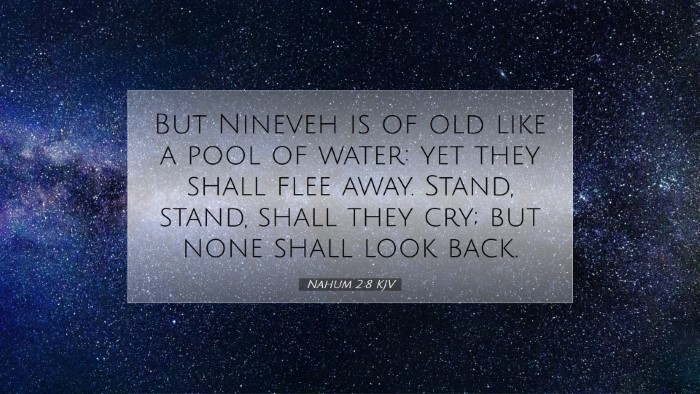Old Testament
Genesis Exodus Leviticus Numbers Deuteronomy Joshua Judges Ruth 1 Samuel 2 Samuel 1 Kings 2 Kings 1 Chronicles 2 Chronicles Ezra Nehemiah Esther Job Psalms Proverbs Ecclesiastes Song of Solomon Isaiah Jeremiah Lamentations Ezekiel Daniel Hosea Joel Amos Obadiah Jonah Micah Nahum Habakkuk Zephaniah Haggai Zechariah MalachiNahum 2:8
Nahum 2:8 KJV
But Nineveh is of old like a pool of water: yet they shall flee away. Stand, stand, shall they cry; but none shall look back.
Nahum 2:8 Bible Commentary
Commentary on Nahum 2:8
Nahum 2:8 states: “But Nineveh has been like a pool of water from her youth; but now they flee away. Stand, stand, shall they cry; but none shall look back.” This verse is rich with implications for understanding the fall of Nineveh and the themes of judgment, judgment's inevitability, and repentance.
Introduction
Nahum, a prophet of the Lord, delivers a message concerning the city of Nineveh, portraying its imminent destruction and the reasons behind God's judgment. This specific verse illustrates the stark contrast between Nineveh's past strength and its present state of panic. The metaphor of a “pool of water” signifies Nineveh's previous stability and abundance, while the subsequent flight of its inhabitants emphasizes impending ruin.
Contextual Analysis
To fully appreciate the richness of Nahum 2:8, we must consider its historical and theological context:
- Historical Background: Nineveh, the capital of Assyria, was known for its grandeur, might, and cruelty. God’s judgment against it was a response to its wickedness, much of which is documented in prophetic literature.
- Theological Implications: This verse exemplifies the justice of God. Just as nature reflects His order, the downfall of Nineveh serves as a warning to nations that stray from divine precepts.
Commentary Insights
Matthew Henry
Henry emphasizes that Nineveh's glory has now turned to shame. He interprets the “pool of water” as indicative of its earlier prosperity but notes that this prosperity has now become a mirage. The city, once confident, is now in disarray, illustrating the theme of God humbling the proud. Henry posits that this passage serves as a reminder that reliance on material strength is futile against divine retribution.
Albert Barnes
Barnes provides an analytical approach by referencing the strategic importance of Nineveh’s waters. He elucidates that just as a “pool” provides life-giving sustenance, so too did Nineveh’s strength give it a false sense of security. Barnes underscores the futility of calling for help (“Stand, stand”) amidst impending catastrophe, suggesting that in times of crisis, distractions from genuine repentance often lead to despair.
Adam Clarke
Clarke brings attention to the implications of “fleeing” from judgment. He reflects on the essence of fear and despair that grips the hearts of Nineveh's citizens. The frantic calls of the fleeing populace reveal their realization that they cannot escape the consequences of divine justice. Clarke articulates that real repentance involves recognition of sin and turning back to God, a lesson still relevant today.
Spiritual Lessons
Nahum 2:8 teaches us profound spiritual lessons applicable to contemporary faith communities:
- Recognition of Sin: It prompts introspection regarding our city's state and our personal lives, urging believers to identify and rectify sinful habits.
- Irony of Strength: The city's downfall illustrates the ironic turn of human strength collapsing in the face of divine authority, reminding believers not to place faith in worldly power.
- A Call to Stand Firm: The cry to “stand” calls us to stability amid turmoil. Believers are reminded to stand firm in faith rather than succumb to fear.
Conclusion
In conclusion, Nahum 2:8 serves as a warning about the transient nature of earthly power and the ultimate supremacy of God's judgment. For pastors, students, theologians, and Bible scholars, this verse compels a reflective examination of reliance in spiritual strength, the gravity of sin, and fortitude in troubling times. The insights drawn from this verse encourage a heartfelt return to God and a steadfastness that arises from His promises, ultimately reinforcing hope amid judgment.


